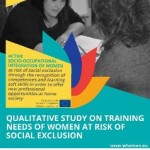 The purpose of the study was to allow a step of fine tuning of the Project strategy with a deeper diagnosis of women situation, training needs and difficulties. With the study it will be easier to define soft skills acquisition/recognition paths and to better propose the experimentation of this protocol.
The purpose of the study was to allow a step of fine tuning of the Project strategy with a deeper diagnosis of women situation, training needs and difficulties. With the study it will be easier to define soft skills acquisition/recognition paths and to better propose the experimentation of this protocol.
This study was conducted in seven countries, where women were divided in two main categories: (1) immigrant and refugee women from Germany, Italy (Veneto region), Romania and Spain (Andaluzia) and (2) women over 45 from Bulgaria, Latvia and Slovenia.
The research combined quantitative and qualitative methods, aiming at a bottom-up approach, involving directly the participants. It was developed in five steps: (1) research the state of the art, (2) collect statistical data for analysis, (3) conduct 158 interviews and analyse the questionnaires, (4) put in place seven focus group (one per country, 120 women in total) and (5) elaborate the SWOT analysis of the data collected.
STUDY MAIN CONCLUSIONS
Here we present the main data and conclusions of the study obtained from the interviews and the focus groups, which in many cases overlap and in other are complementary. The full detailed information, data and conclusion can be found on the full report, available in the Project website: http://www.whomen.eu. In particular you will find details about a multitude of aspects and variables, such as involved groups, socioeconomic characterisation per country, state of art by country, main ideas and conclusions of each country and all the numbers and statistics collected.
THE WOMEN THAT PARTICIPATED IN THIS STUDY
Most of the women interviewed are 45 years old or older (61,4%), while 14% are under 30. A total of 120 are immigrants and refugees coming from Europe (45%), Asia (23,4%) and America (20,9%). Almost half of them are living in the hosting countries for four years or more and most have a permit of residence and work. Even if 44,3% are still unsure about staying in the hosting country, 48,1% declared this to be their goal. Most of them have children, while around 20% live alone.
Apart from the women from Maghreb region and women over 45, most of the women have high qualifications – 38,7% have a university degree and 12,1% a vocational diploma, while 21,6% have completed secondary school education. Formal recognition of studies and training were possible for only to 38% of them. The non recognition of studies and experiences forces them to accept jobs that have a low pay and are inadequate their profile and competences (as 24% stated).
THEIR PERCEPTIONS ON THE LABOUR MARKET
The challenge of balancing professional life with personal life is at the centre women’s concerns, and that is why, for many, the solution was to become self-employed, which poses challenges in terms of their preparation and support as entrepreneurs.
Besides the language barriers previously mentioned, there are also distance barriers as they have to commute, representing time and money costs for these women. Additionally, age also becomes a discriminating factor.
Currently, in the group interviewed, 32,5% are unemployed, 10% are working without contract and only 28,3% have permanent contracts. Their works are related mostly with agriculture and services, in particular taking care of dependents (elders and children). More than half (54,7%) would change jobs if they could, but their motivations and expectations are very low when it comes to a possible change of professional area.
Altogether, 61% of the women declared to be hard even to find a job. The most common difficulties mentioned are: lack of employment, age, lack of experience, lack of training and lack of communication skills.
